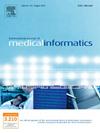Acceptability and perceived usefulness of the CHAMPS intervention for improving medication adherence among people with HIV in Alabama and New York
IF 3.7
2区 医学
Q2 COMPUTER SCIENCE, INFORMATION SYSTEMS
International Journal of Medical Informatics
Pub Date : 2025-05-05
DOI:10.1016/j.ijmedinf.2025.105959
引用次数: 0
Abstract
Background
Antiretroviral therapy allows people with HIV to manage the disease as a chronic illness rather than a fatal diagnosis as regular adherence can lead to viral suppression. It is estimated, however, that less than two-thirds of people with HIV in the United States sustain viral suppression. Community Health Workers and mHealth to Improve Viral Suppression (CHAMPS) is useful for improving and personalizing care and may help promote medication adherence among people with HIV.
Objective
We aimed to understand acceptability and perceived usefulness of the CHAMPS intervention.
Methods
In-depth interviews were carried out with a total of 42 intervention participants from the RCT of the CHAMPS intervention versus standard of care on ART adherence and viral suppression among PWH, which enrolled participants between May 2021 and May 2023 in the NYC and Birmingham, AL areas, to obtain feedback on the CHAMPS intervention, a combination of CHW sessions, and the CleverCap app and device. Interviews were transcribed and coded using a codebook guided by the Unified Theory of Acceptance and Use of Technology framework.
Results
Participants ranged from 19 to 65 years old with a mean of 47 years. Most participants (62 %) identified as cisgender female, 33 % as cisgender male, 2 % as transgender male, and 2 % as transgender female. Participants believed the CleverCap app and device and CHW sessions were useful for medication adherence and, consequently, reducing viral load. Participants identified varying levels of difficulty with using the intervention, and varying levels of comfort with using the intervention in public settings. Overall, participants felt they could integrate the intervention into their daily lives and that it was instrumental in achieving improved health status and quality of life.
Conclusion
Despite some complexities associated with use of the intervention, participants overwhelmingly demonstrated interest in and were pleased with the CleverCap app and device and CHW sessions for improvement of viral load and overall health status. Positive feedback during the interviews supports future testing of the CHAMPS mHealth and CHW intervention.
阿拉巴马州和纽约州CHAMPS干预改善HIV感染者服药依从性的可接受性和感知有用性
抗逆转录病毒治疗使艾滋病毒感染者能够将这种疾病作为一种慢性疾病而不是致命的诊断来管理,因为定期坚持治疗可导致病毒抑制。然而,据估计,在美国,只有不到三分之二的艾滋病毒感染者能够维持病毒抑制。社区卫生工作者和移动医疗改善病毒抑制(CHAMPS)有助于改善和个性化护理,并可能有助于促进艾滋病毒感染者的药物依从性。目的了解CHAMPS干预的可接受性和感知有用性。方法在2021年5月至2023年5月期间,在纽约市和阿拉巴马州伯明翰地区招募参与者,对来自CHAMPS干预与标准护理的PWH中ART依从性和病毒抑制的随机对照试验的42名干预参与者进行了深度访谈,以获得关于CHAMPS干预、CHW会议组合以及CleverCap应用程序和设备的反馈。访谈由技术接受和使用统一理论框架指导,使用代码本进行转录和编码。结果参与者年龄19 ~ 65岁,平均年龄47岁。大多数参与者(62%)为顺性别女性,33%为顺性别男性,2%为跨性别男性,2%为跨性别女性。参与者认为,CleverCap应用程序和设备以及CHW会议有助于药物依从性,从而降低病毒载量。参与者确定了使用干预的不同程度的困难,以及在公共环境中使用干预的不同程度的舒适。总体而言,参与者认为他们可以将干预措施纳入日常生活,并认为这有助于改善健康状况和生活质量。结论:尽管干预措施的使用存在一些复杂性,但绝大多数参与者对CleverCap应用程序、设备和CHW会议表现出兴趣,并对其感到满意,以改善病毒载量和整体健康状况。访谈期间的积极反馈支持CHAMPS移动健康和CHW干预措施的未来测试。
本文章由计算机程序翻译,如有差异,请以英文原文为准。
求助全文
约1分钟内获得全文
求助全文
来源期刊

International Journal of Medical Informatics
医学-计算机:信息系统
CiteScore
8.90
自引率
4.10%
发文量
217
审稿时长
42 days
期刊介绍:
International Journal of Medical Informatics provides an international medium for dissemination of original results and interpretative reviews concerning the field of medical informatics. The Journal emphasizes the evaluation of systems in healthcare settings.
The scope of journal covers:
Information systems, including national or international registration systems, hospital information systems, departmental and/or physician''s office systems, document handling systems, electronic medical record systems, standardization, systems integration etc.;
Computer-aided medical decision support systems using heuristic, algorithmic and/or statistical methods as exemplified in decision theory, protocol development, artificial intelligence, etc.
Educational computer based programs pertaining to medical informatics or medicine in general;
Organizational, economic, social, clinical impact, ethical and cost-benefit aspects of IT applications in health care.
 求助内容:
求助内容: 应助结果提醒方式:
应助结果提醒方式:


